This graphic shows currently available options for HIV prevention, newly approved and recommended treatment, and those in development.
The HIV Prevention Pipeline
Years Ahead in HIV Prevention Research: Time to Market
This timeline shows the potential time points when the next-generation of HIV prevention options might find their way into new programs.
Trials & Projects Halted by USAID Funding Suspension
The stop-work orders have disrupted USAID-supported HIV prevention research, halting critical investigations in vaccine and next-generation PrEP strategies.
The abrupt suspension of these trials also raises serious ethical concerns. Stopping trials mid-course undermines trust in research, jeopardizes community engagement, and abandons participants who volunteer their bodies for scientific discovery. It will take years to build back this critical infrastructure—for HIV research and beyond—as well as the community partnership and trust needed to ensure smooth and ethical research.
Avac Event
HIVR4P 2024
The 5th HIV Research for Prevention (R4P) conference is being held in Lima, Peru from 6 to 10 October. Held every two years, HIVR4P is the only global conference to focused exclusively on biomedical HIV prevention, including AIDS vaccines, microbicides, PrEP, treatment as prevention and other approaches.
See below for conference highlights, recaps and announcements.
Conference Highlights and Recaps
- Pre-conference Highlights from HIVR4P 2024
- HIVR4P Highlights Access and Choice: Inextricably Linked
- HIVR4P Wednesday Highlights: Access Access Access
- HIVR4P Thursday Highlights: Centering Communities
Announcements
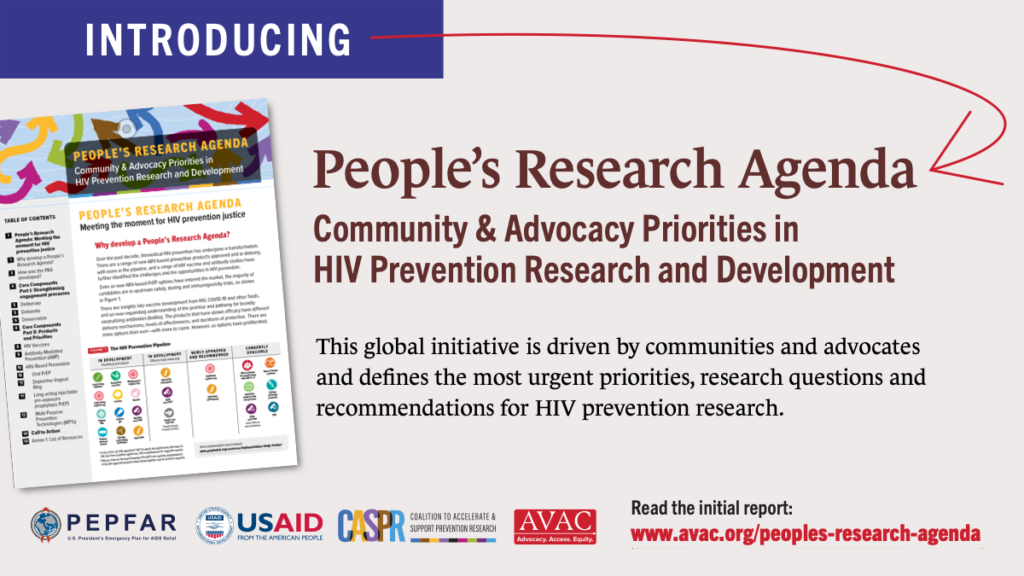
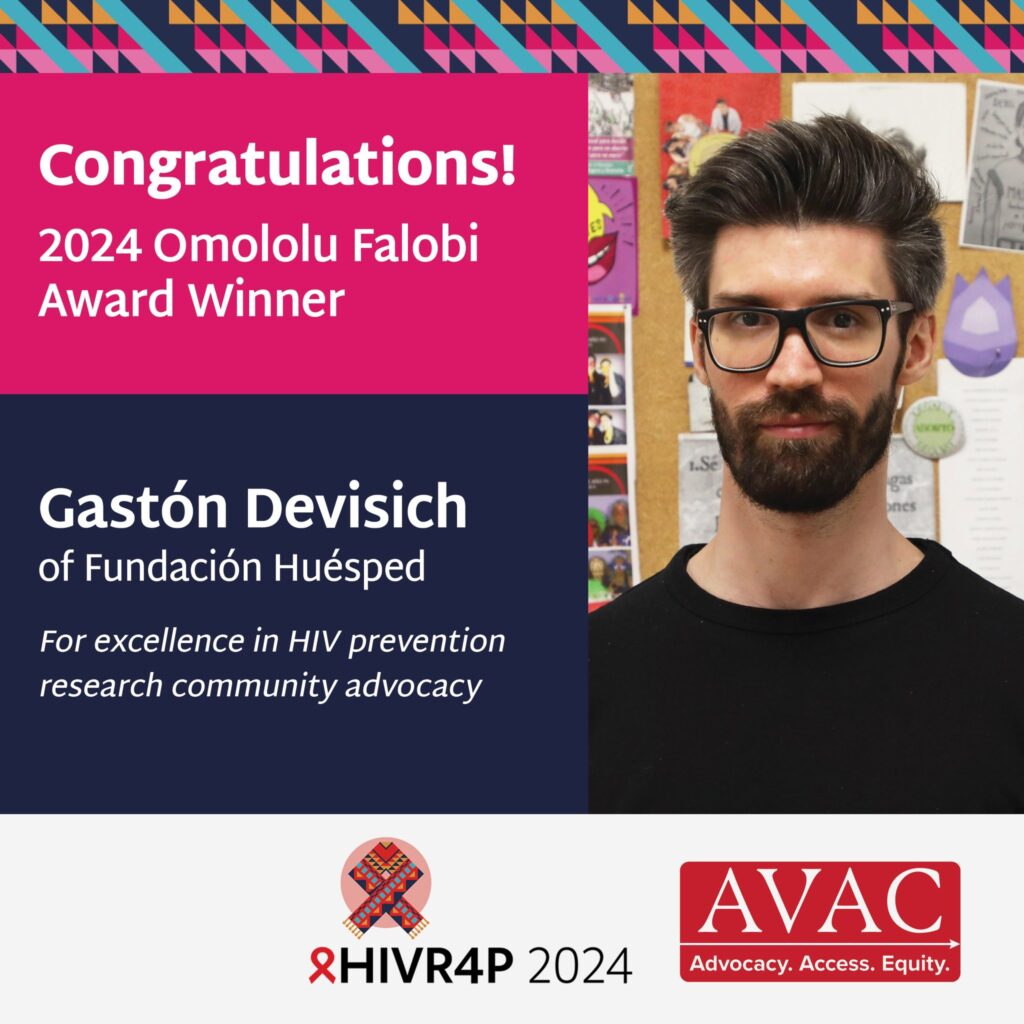
First Full Day of AIDS 2024
Lenacapavir for PrEP has taken center stage at the 25th International AIDS Conference, #AIDS2024, which opened Monday with many highlighting its potential for long-acting PrEP for HIV prevention. Some advocates took to the halls in protest calling on LEN’s maker to price the product low. Leaders across HIV voiced the need for urgency in galvanizing support for the introduction of lenacapavir. “It is gobsmackingly exciting to see zero in a clinical trial” AVAC’s Mitchell Warren told Forbes. The potential to bend the curve of the epidemic depends on speeding access to prevention options like LEN, that show high efficacy.
At the same time, it’s imperative to remember that neither lenacapavir, nor any other single product, now or in the future, will ever be a ‘miracle drug’, and LEN must not be equated with a vaccine, as seen in some conference media reports.
Ongoing investment in the pipeline for HIV prevention must be founded on the principle of choice, offering a range of products to meet diverse needs among people facing the risk of HIV. We hope that vaccines will one day be among those choices, as will long and short-acting products, and topical and systemic products. Clear communication that allows product users to understand how products are different supports widespread adoption of HIV prevention and moves the world toward finally ending the epidemic.
See AVAC’s statement calling for early planning to accelerate LEN’s regulatory review and for ambitious introduction plans, and the joint civil society call to action with specific priorities about what needs to happen next. Our primer, the Lens on LEN, also offers advocates a guide in explaining the findings from the Purpose 1 trial and next steps for advocacy.
As Albert Liu from UCSF’s Center for AIDS Research told delegates in the symposium on breakthrough and insights in long-acting technologies, “It’s never just the ‘product.’ New options can’t solve everything.” Atul Gawande of USAID reiterated a similar message at the satellite focused on women’s prevention, “The critical message to understand is that there isn’t going to be a magic bullet for prevention. What we have to understand is that there are also considerations that affect the likelihood that women will have what they want and what they’re likely to use.”
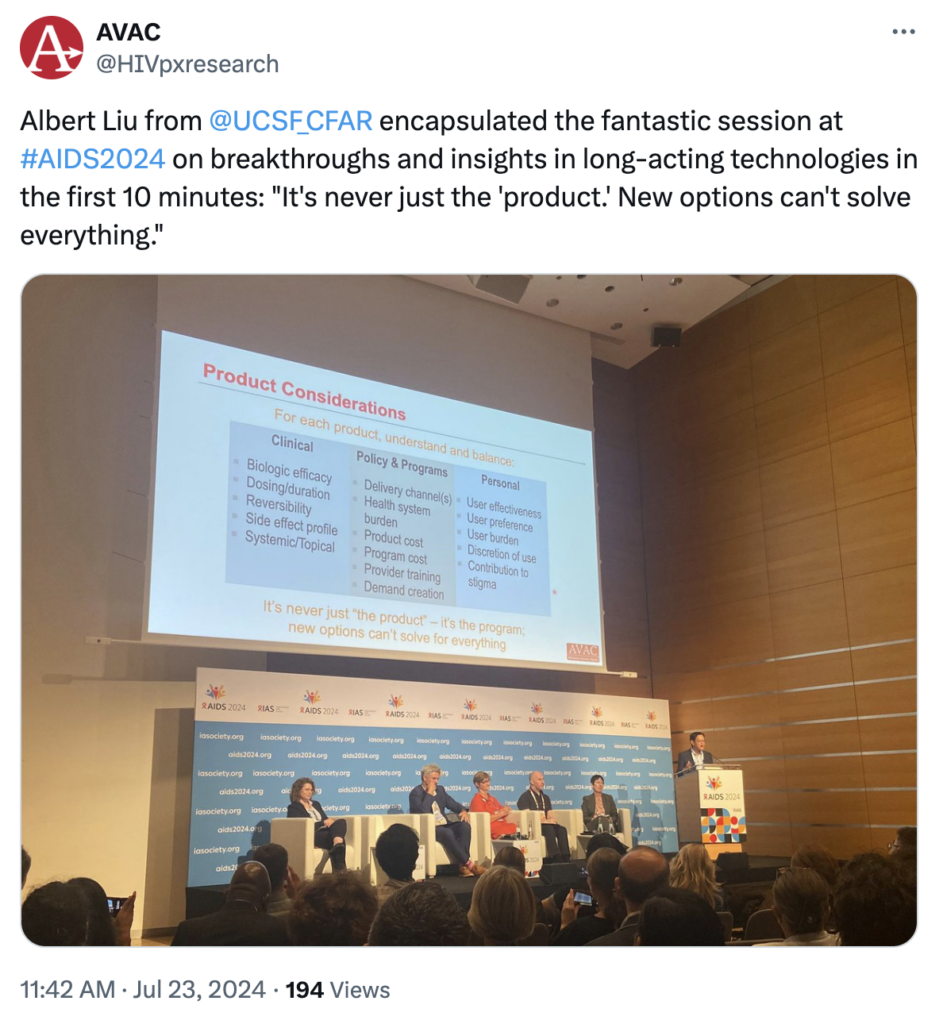
People First
The conference theme, “Put People First,” is the main message we all must hear. Lillian Mworeko of the International Community of Women living with HIV/AIDS East Africa (ICWEA) captured the essence of the meeting: “I am not just a recipient of care. I need a seat at the table to meaningfully engage and tell people what I need and how I need it.”
Monday’s opening session underscored the vital role of community engagement and the necessity for inclusive policies that address disparities affecting marginalized populations. Jay Mulucha of Fem Alliance, Uganda, the first trans man to speak at the International AIDS Conference, delivered a compelling message to the 12,000+ delegates attending both in person and online: “As a trans man living in Uganda, I am asking you to stop leaving us behind. Nothing about us, without us.”

New UNAIDS Report
UNAIDS released a report, The Urgency of Now, AIDS at a Crossroads calling out funding disparities and the need to dismantle the discrimination and stigma that are pushing the most marginalized people away from health care. The report warned of the peril in delayed funding decisions; investment needs to happen urgently for long-acting treatment and prevention options to reach all low- and middle-income countries and meet 2025 targets.
Money, Money, Money
Making the most of investment in HIV prevention fundamentally depends on political will, but the field needs the right data, too. Monday’s satellite session, Money, money, money: Building towards a sustainable end state for HIV prevention, called for better data that goes beyond PrEP initiation numbers. “[PrEP initiations] alone do not tell us how much product is needed or how long people stay on PrEP. We are not collecting the right data,” said Katherine Kripke of Avenir Health. AVAC’s Mitchell Warren described the vicious cycle of small pilot projects generating limited data on PrEP use, resulting in unpredictable demand and cautious investment. “We have lots of small examples, and then we don’t scale it up because governments don’t know what it will cost. And still the world has 1.3 million new infections. We have to break the cycle.”
The Future of Women’s Prevention
At the session organized by CASPR (Coalition to Accelerate & Support Prevention Research) and MATRIX (Microbicide R&D to Advance HIV Prevention Technologies through Responsive Innovation and Excellence), New ways for the next wave: Innovative R&D for the future of women’s prevention, MATRIX laid out their innovative approach that involves very early engagement of all stakeholders in the research, development and delivery of new products for HIV prevention. The session emphasized the equitable inclusion of women in all phases and in every aspect of R&D—as researchers, potential users, and advocates.
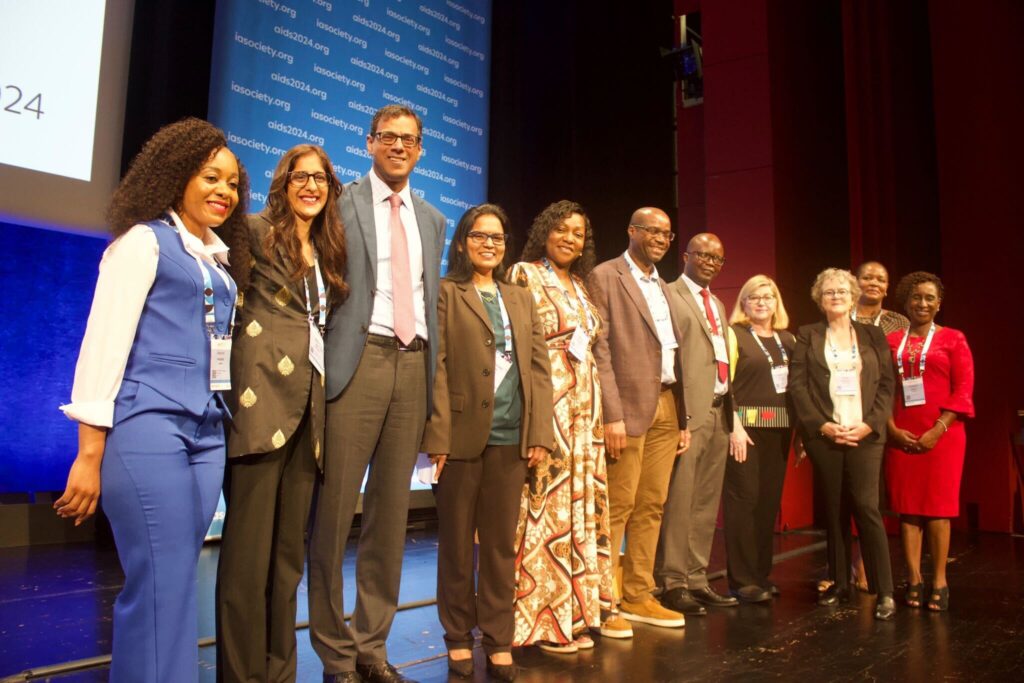
Sharon Hillier of Magee-Women’s Research Institute noted, “What we’ve learned in our research is that women care about efficacy, but it’s just one element of what they consider when they decide on prevention. They’re quite interested in safety, ease of use, discretion, price, availability, and accessibility.”
Stay tuned for more highlights from AIDS 2024 and visit our curated conference webpage, which includes new resources and summaries of the preconference sessions.
Upcoming Webinars and a Roundup of New Resources
Last week’s interim result of the PURPOSE 1 HIV prevention study of injectable lenacapavir is captivating headlines. Check out AVAC’s statement here and one from the PURPOSE 1 Global Community Accountability Board and the African Women’s Prevention Community Accountability Board here. But there are LOTS of other things also happening in HIV prevention, and we’re delighted to share this roundup.
Upcoming Webinars
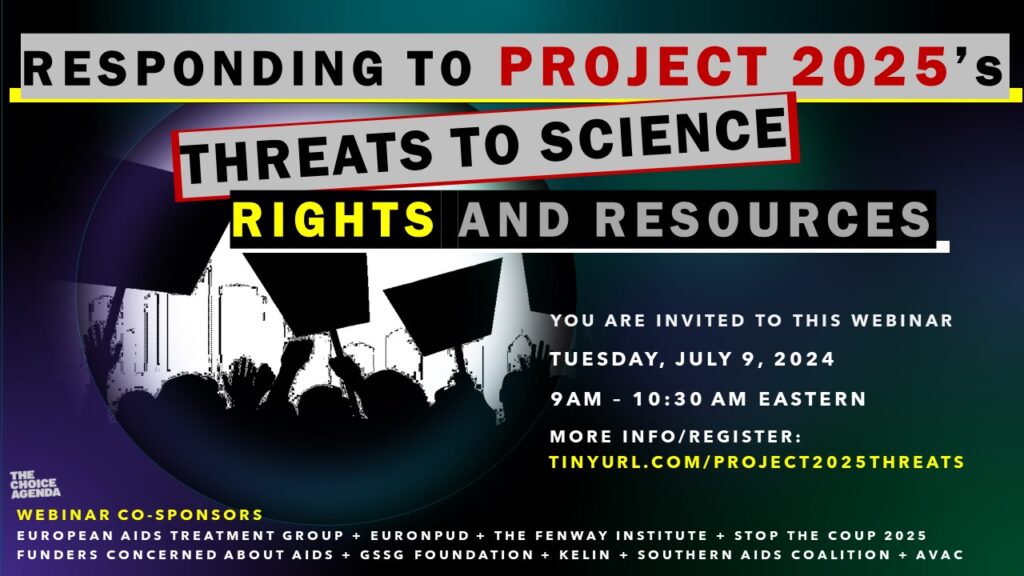
Responding to Project 2025’s Threats to Science, Rights and Resources
Project 2025 is part of an ongoing multi-pronged backlash to the sexual and reproductive health, gender and LGBTQ+ movements. Building on the experience of the HIV movement in fighting these same far-right forces, join this Choice Agenda webinar discussing potential responses through the lens of HIV affected communities and programs. Register here
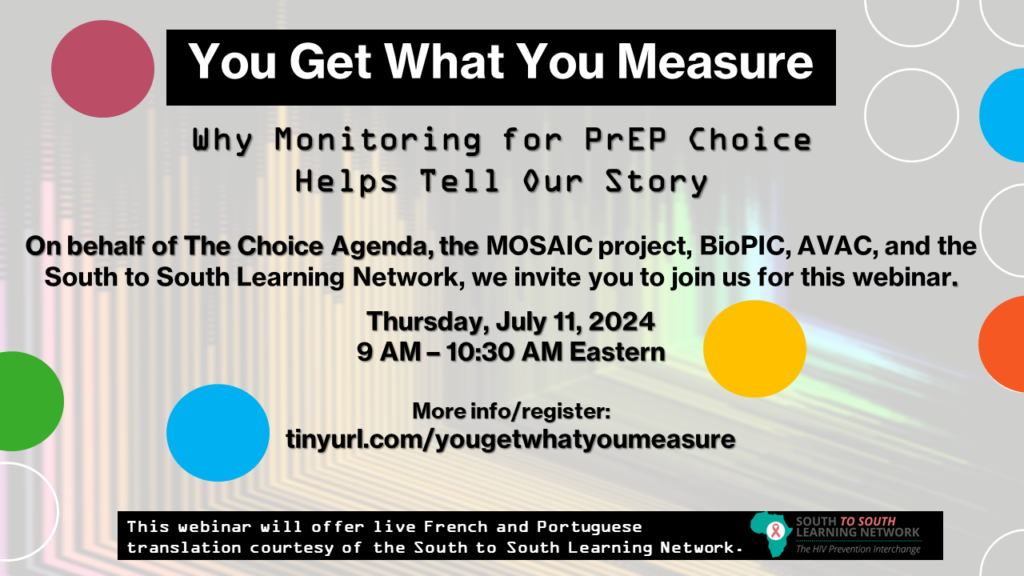
You Get What You Measure: Why Monitoring for PrEP Choice Helps Tell Our Story
The data collected on a program determines its path and priorities. This Choice Agenda webinar will cover the current state of PrEP monitoring and evaluation, and efforts to improve and simplify data-gathering to better reflect how people use PrEP and to support choice amongst the growing array of PrEP methods. And the discussion will also focus on how data can be used to enhance the stories we tell about PrEP program implementation. Register here
Recordings and Resources
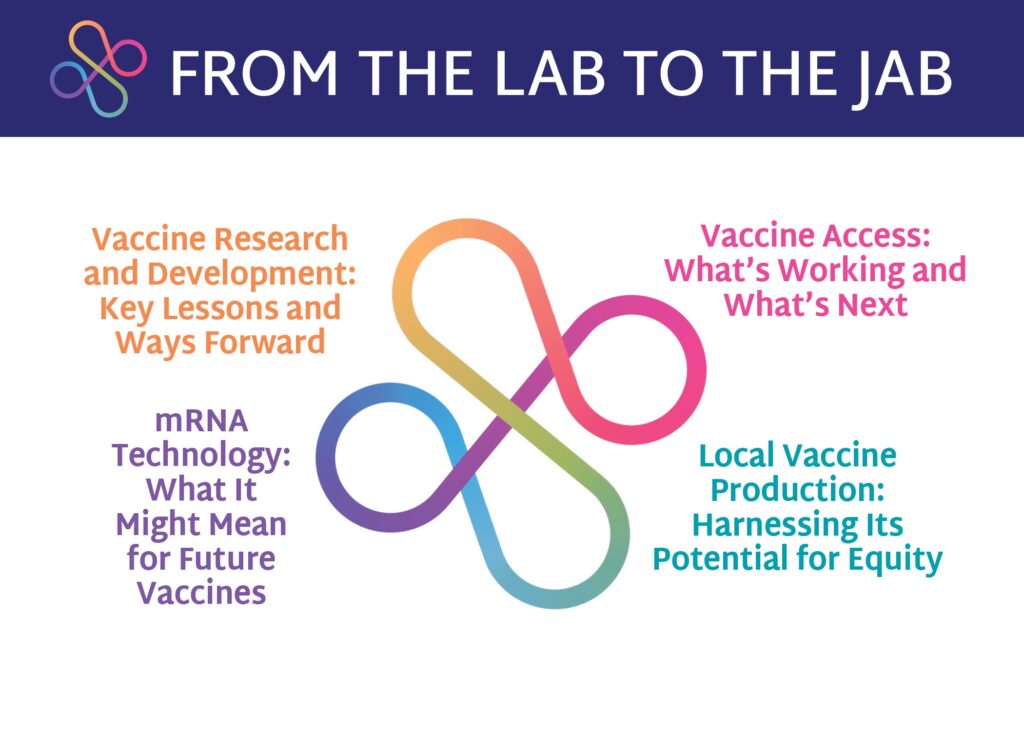
From The Lab To The Jab Webinar and Issue Briefs
Earlier this month, AVAC hosted a webinar highlighting our series of issue briefs, From The Lab To The Jab, covering research and development, mRNA technology, vaccine production, issues relevant to equitable global access to vaccines. The webinar featured panelists from the International Vaccine Institute, International Treatment Preparedness Coalition, and æqua, a think tank focused on equity and economic justice for health. Panelists discussed international initiatives for vaccine development, the current state of vaccine research and access, and how they can be improved. Read more
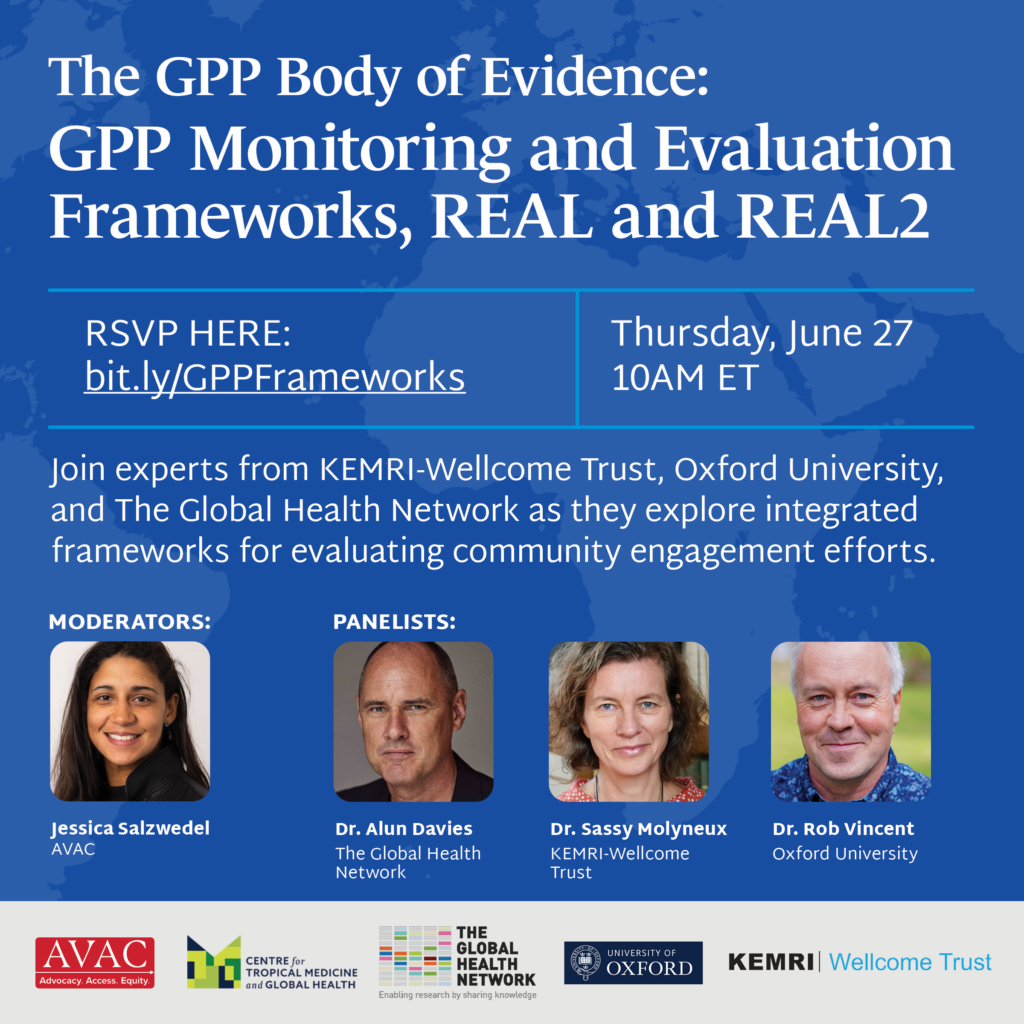
The GPP Body of Evidence: GPP Monitoring and Evaluation Frameworks, REAL and REAL2
GPP is an essential part of clinical trials research, and an ethical imperative to creating equitable and effective clinical trials. GPP is created by and for communities, so it looks different and takes multiple forms in different cultural contexts. This kind of responsiveness is inherent to GPP, but it also makes it difficult to measure and evaluate. In this webinar, participants will learn from the Realist Review of Community Engagement and the REAL2 review of participatory research. Each examined frameworks for evaluating community engagement efforts. We’ll also learn about the Global Health Network’s new course on evaluation, and other efforts in the field to evaluate the impact of GPP. View the recording
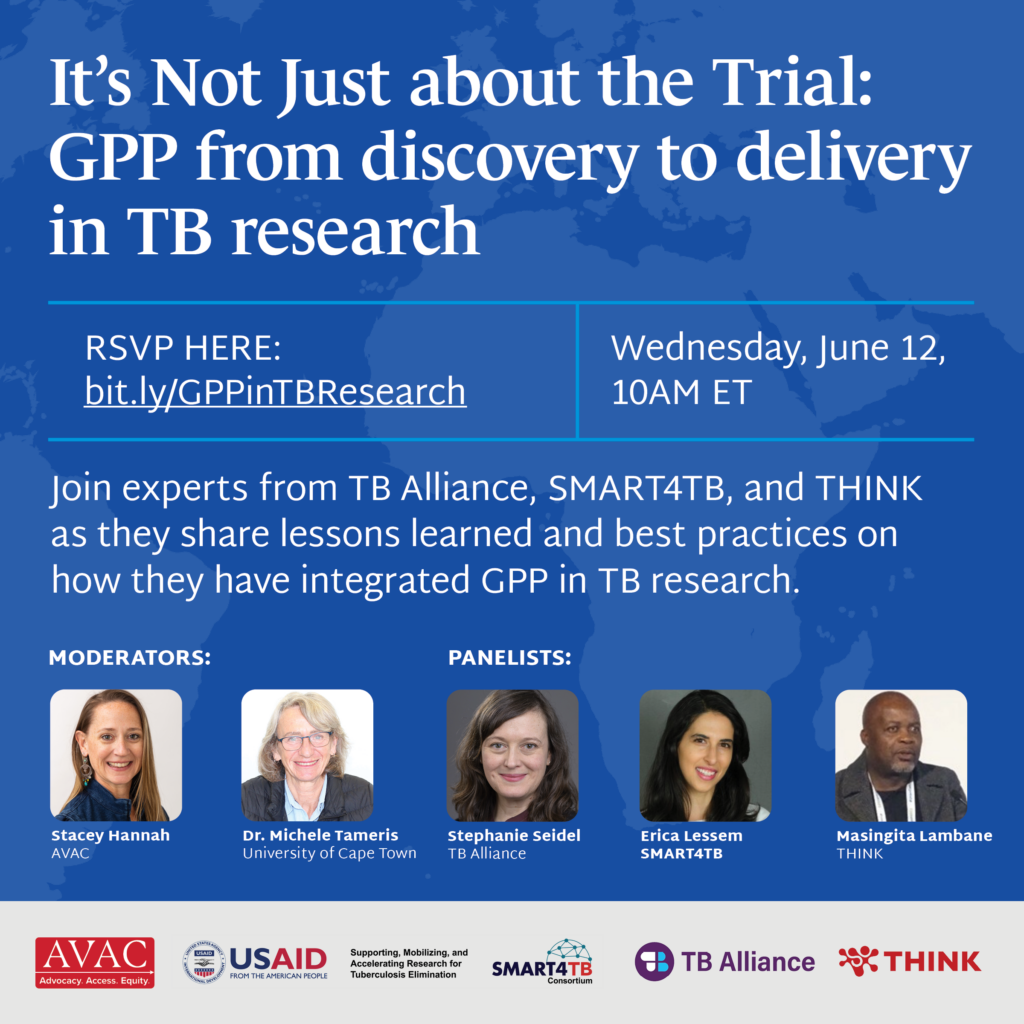
It’s Not Just about the Trial: GPP from discovery to delivery in TB research
GPP enhances every stage of the research lifecycle. In this webinar, our partners at TB Alliance, SMART4TB, and THINK shared experiences, lessons learned, and innovative approaches in integrating GPP at the organizational, network and situational level, from drug development through delivery. View the recording
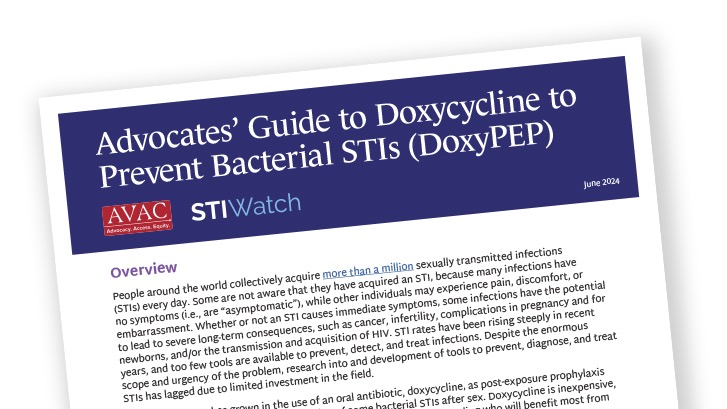
Advocates’ Guide to Doxycycline to Prevent Bacterial STIs (DoxyPEP)
Doxycycline, an oral antibiotic, can be used as a post-exposure prophylaxis, commonly referred to as DoxyPEP, when used to prevent the acquisition of some bacterial STIs after sex. Doxycycline is inexpensive, easily tolerated, and widely available. However, questions remain regarding who will benefit most from DoxyPEP and how to implement this strategy broadly to ensure equitable access and minimize antimicrobial resistance. This guide seeks to explore and address these critical questions. Read the guide
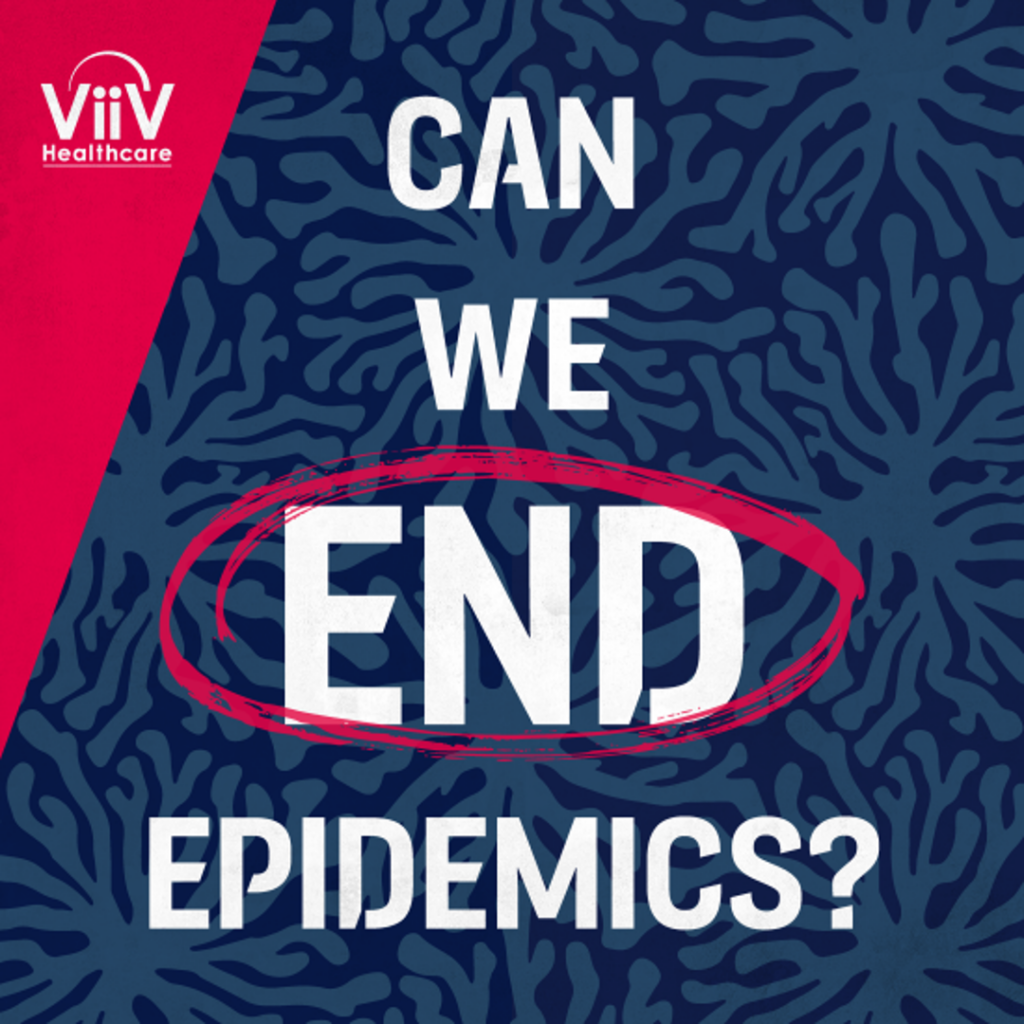
Episode 3: The Promising Science
Our Mitchell Warren speaks to ViiV’s Kimberly Smith in this episode of the Foreign Policy podcast series ‘can we end epidemics?’ about the future of HIV science and the challenges we need to overcome on our journey to finding a cure. Listen
We hope these conversations and resources are helpful in your advocacy. Stay tuned for our upcoming advocates’ primer on lenacapavir and our roadmap to the AIDS 2024 conference in Munich.
From The Lab To The Jab: Lessons learned and what’s next in HIV vaccine research
On 3 June 2024, AVAC hosted a webinar highlighting its Lab to Jab issue briefs on research and development, production and equitable global access to vaccines.
Platforms, Not Pathogens
“[Our approach to access and equity] has to be intentional, not incidental, and it has to be empowered, not vulnerable.” — Dr. Jerome Kim, International Vaccine Institute
Panelists stressed an intentional, rather than incidental approach to ensuring global vaccine access and equity, going from pathogens to platforms, and having LMICs move from consumers to actors. They described ways to transform vaccine R & D from a financial imperative of pharmaceutical corporations into a system that addresses health needs through medical innovation. They underscored the importance of new, equity-based models to move low- and middle-income countries from being recipients of vaccine technology to co-creators from the very beginning of the R & D process. These models can work through in-country partnerships for vaccine development and production, shared technology and know-how, use of TRIPS flexibilities, intellectual property waivers and access conditions, and establishing a local production ecosystems.
The webinar featured Dr Jerome Kim, Director General of the International Vaccine Institute, Othoman Mellouk, Access to Diagnostics and Medicines Lead at the International Treatment Preparedness Coalition, and Dr Els Torreele, Founding Director of æqua, a recently created think tank on equity and economic justice for health. The panelists discussed international initiatives for vaccine development, the current state of vaccine research and access, and how they can be improved.
From Consumers to Actors
“Driving innovation at the regional R&D hubs means creating access to the technology platforms that can be adapted to new pathogens or the local health needs.” — Dr. Els Torreele, æqua
As of December 2023, only 56% of the world’s population received a complete series of COVID-19 vaccines, and only 28% had at least one booster dose. Many low- and middle-income countries (LMIC) were last in line to purchase overpriced vaccines. Lack of access to Mpox vaccines in Africa, where it is endemic, continues. These inequities are driven by the current profit-driven model and intellectual property barriers—but there could be a different way.
One major initiative discussed is being spearheaded by the International Vaccine Initiative (IVI), a UN-chartered organization dedicated to accelerating vaccine R&D for global health. Through its robust partnerships, and funding from the Gates Foundation, it has developed two approved vaccines (for cholera and thyphoid)–for less than $30 million each. The IVI also hosts the Advancing Vaccine End-to-End Capabilities in Africa (AVEC) Initiative, which aims to accelerate the development of the African ecosystem for vaccine R&D. Its aim is to support a powerhouse of continental manufacturing through a sustainable pan-African alliance that executes on the ground.
For more information, see:
- Recording and slides
- From The Lab To The Jab series
- HVAD webinar recording
- Px Pulse podcast with Nina Russell
On Access and Equity
“The problem is, until now, our countries are thinking mostly as consumers, not as actors. We only heard a little bit about some initiatives during COVID, because everybody woke up.” — Othoman Mellouk, International Treatment Preparedness Coalition
Top Vaccines Funders
Total US dollars invested by each of the top 10 global funders of vaccine research in 2022.
Avac Event
From the Lab to the Jab: Lessons learned and what’s next in HIV vaccine research
AVAC’s issue briefs, From the Lab to the Jab, cover the barriers to, and solutions for equitable access to vaccines in low- and middle-income countries. During this webinar, an expert panel discussed lessons learned, an international initiative for vaccine development, and how research and access can be improved.
Moderators:
- Mitchell Warren, AVAC
- Tracy Swan, AVAC and Make Medicines Affordable Campaign
Panelists:
- Dr. Jerome Kim, International Vaccine Institute
- Dr. Els Torreele, æqua
- Othoman Mellouk, International Treatment Preparedness Coalition
Recording / Dr. Jerome Kim Slides / Dr. Els Torreele Slides / Othoman Mellouk Slides
An HIV Vaccine: Looking into the Future with Nina Russell
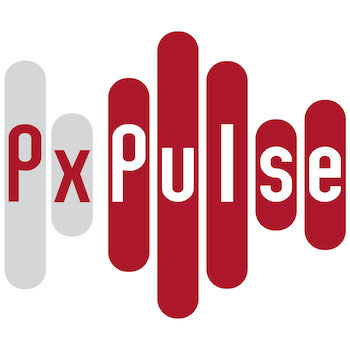
On HIV Vaccine Awareness Day in 2024, the field is confronting extraordinary breakthroughs and extraordinary challenges.
It’s considered one of the most important and most difficult scientific enterprises in the history of modern medicine—the hunt for an HIV vaccine. It has led to vast knowledge of HIV and the immune system, and to breakthrough technology (think COVID vaccines and mRNA platforms). But developing an effective HIV vaccine is still out of reach. Meanwhile, HIV incidence remains intractably high in hard-hit regions around the world, even as the field is hoping to speed up access to longer-acting PrEP. It’s a complex landscape, alongside incredibly complex science in HIV vaccine R&D.
In this episode of PxPulse, Dr. Nina Russell, Director of TB & HIV Research and Development for the Bill and Melinda Gates foundation, talks about where she sees promise in the science, the goals for an HIV vaccine, and why it has an essential role to play, alongside the scale up of PrEP.
Listen
Resources
- Just What is Discovery Medicine? And what Does it Mean for HIV Vaccine Research, May 16 webinar
- HIV Vaccine and Antibody Efficacy Trials to Date, infographic
- From the Lab to the Jab, issue briefs
- Evolving Strategies for an HIV Vaccine: One researcher explains where the field is going and why? (21:23), PxPulse episode
- Research Fundamentals: An HIV Vaccine — What’s the challenge and what’s the science? (12:03), PxPulse episode